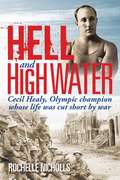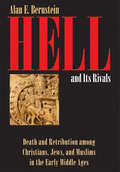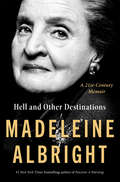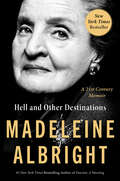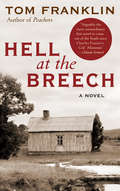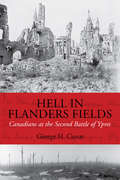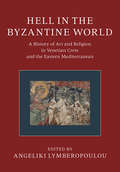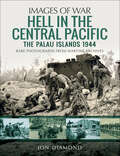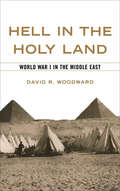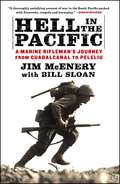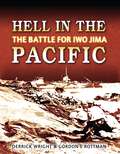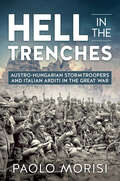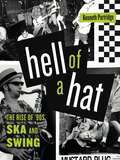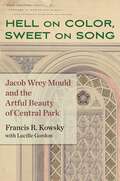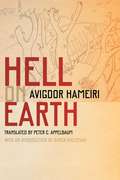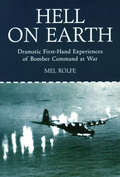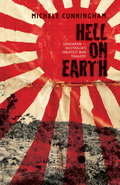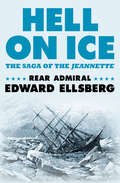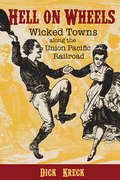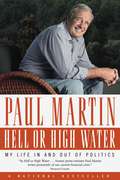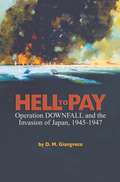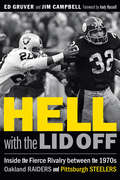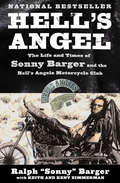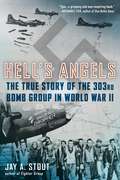- Table View
- List View
Hell and High Water: Cecil Healy, Olympic Champion whose life was cut short by war
by Rochelle NichollsThe golden boy of Australian swimming and captain of the lifeguards on Manly Beach, Cecil Healy was the poster-boy for all that was decent in Australia before World War I. Powerful, bronzed and daring, his fearlessness made him a leader in the embryonic surf-lifesaving movement, and his unique crawl stroke captured swimming records across the globe. Healy became the darling of the Olympic movement in 1912 when he allowed a disqualified rival to swim and take the 100 metres freestyle title, sacrificing almost certain victory for fair play and honour. But Cecil Healy’s seemingly perfect life was beset by darkness and secrets. His repressed sexuality and inner demons drove him to acts of recklessness which would culminate in his supreme sacrifice on the battlefields of France. As World War I raged, the Olympic champion refused to remain protected behind the lines. His death on the Somme in 1918, charging a German machine-gun post, embodies the tortured self-destructiveness which still drives many male sportsmen to both glory and disaster. Cecil Healy remains the only Australian Olympic gold medallist to have given his life in the theatre of war. This book chronicles both Healy’s glittering sports performances and the torment behind this great, lost Olympian.
Hell and Its Rivals: Death and Retribution among Christians, Jews, and Muslims in the Early Middle Ages
by Alan E. BernsteinThe idea of punishment after death—whereby the souls of the wicked are consigned to Hell (Gehenna, Gehinnom, or Jahannam)—emerged out of beliefs found across the Mediterranean, from ancient Egypt to Zoroastrian Persia, and became fundamental to the Abrahamic religions. Once Hell achieved doctrinal expression in the New Testament, the Talmud, and the Qur'an, thinkers began to question Hell’s eternity, and to consider possible alternatives—hell’s rivals. Some imagined outright escape, others periodic but temporary relief within the torments. One option, including Purgatory and, in the Eastern Orthodox tradition, the Middle State, was to consider the punishments to be temporary and purifying. Despite these moral and theological hesitations, the idea of Hell has remained a historical and theological force until the present.In Hell and Its Rivals, Alan E. Bernstein examines an array of sources from within and beyond the three Abrahamic faiths—including theology, chronicles, legal charters, edifying tales, and narratives of near-death experiences—to analyze the origins and evolution of belief in Hell. Key social institutions, including slavery, capital punishment, and monarchy, also affected the afterlife beliefs of Jews, Christians, and Muslims. Reflection on hell encouraged a stigmatization of "the other" that in turn emphasized the differences between these religions. Yet, despite these rivalries, each community proclaimed eternal punishment and answered related challenges to it in similar terms. For all that divided them, they agreed on the need for—and fact of—Hell.
Hell and Other Destinations: A 21st-Century Memoir
by Madeleine AlbrightSix-time New York Times bestselling author and former Secretary of State Madeleine Albright—one of the world’s most admired and tireless public servants—reflects on the final stages of one’s career, and working productively into your later decades in this revealing, funny, and inspiring memoir. <P><P>In 2001, when Madeleine Albright was leaving office as America’s first female secretary of state, interviewers asked her how she wished to be remembered. “I don’t want to be remembered,” she answered. “I am still here and have much more I intend to do. As difficult as it might seem, I want every stage of my life to be more exciting than the last. <P><P>”In that time of transition, the former Secretary considered the possibilities: she could write, teach, travel, give speeches, start a business, fight for democracy, help to empower women, campaign for favored political candidates, spend more time with her grandchildren. Instead of choosing one or two, she decided to do it all. <P><P>For nearly twenty years, Albright has been in constant motion, navigating half a dozen professions, clashing with presidents and prime ministers, learning every day. Since leaving the State Department, she has blazed her own trail—and given voice to millions who yearn for respect, regardless of gender, background, or age. <P><P>Hell and Other Destinations reveals this remarkable figure at her bluntest, funniest, most intimate, and most serious. It is the tale of our times anchored in lessons for all time, narrated by an extraordinary woman with a matchless zest for life. <P><P><b>A New York Times Bestseller</b>
Hell and Other Destinations: A 21st-Century Memoir
by Madeleine Albright“Richly detailed. . . an intimate portrait of a diplomat.” —New YorkerFrom the seven-time New York Times bestselling author and former Secretary of State Madeleine Albright—among history's most admired and tireless public servants—a revealing, funny, and inspiring reflection on the challenge of continuing one’s career far beyond the normal age of retirementIn 2001, when Madeleine Albright was leaving office as America’s first female secretary of state, interviewers asked her how she wished to be remembered. “I don’t want to be remembered,” she answered. “I am still here and have much more I intend to do. As difficult as it might seem, I want every stage of my life to be more exciting than the last.”In that time of transition, the former Secretary considered the possibilities: she could write, teach, travel, give speeches, start a business, fight for democracy, help to empower women, campaign for favored political candidates, spend more time with her grandchildren. Instead of choosing one or two, she decided to do it all. For nearly twenty years, Albright was in constant motion, navigating half a dozen professions, clashing with presidents and prime ministers, learning every day. After leaving the State Department, she blazed her own trail—and gave voice to millions who yearned for respect, regardless of gender, background, or age.Hell and Other Destinations reveals this remarkable figure at her bluntest, funniest, most intimate, and most serious. It is the tale of our times anchored in lessons for all time, narrated by an extraordinary woman who had a matchless zest for life.
Hell at the Breech
by Tom FranklinIn 1897, an aspiring politician is mysteriously murdered in the rural area of Alabama known as Mitcham Beat. His outraged friends -- --mostly poor cotton farmers -- form a secret society, Hell-at-the-Breech, to punish the townspeople they believe responsible. The hooded members wage a bloody year-long campaign of terror that culminates in a massacre where the innocent suffer alongside the guilty. Caught in the maelstrom of the Mitcham war are four people: the aging sheriff sympathetic to both sides; the widowed midwife who delivered nearly every member of Hell-at-the-Breech; a ruthless detective who wages his own war against the gang; and a young store clerk who harbors a terrible secret.Based on incidents that occurred a few miles from the author's childhood home, Hell at the Breech chronicles the events of dark days that led the people involved to discover their capacity for good, evil, or for both.
Hell in Flanders Fields: Canadians at the Second Battle of Ypres
by George H. CassarOn 22 April 1915, the men of the 1st Canadian Division faced chlorine gas, a new lethal weapon against which they had no defence. In defiance of a particularly horrible death, or, at the very least, severe lung injury, these untested Canadians fought almost continuously for four days, often hand-to-hand, as they clung stubbornly against overwhelming odds to a vital part of the Allied line after the French units on their left fled in panic. By doing so, they saved 50,000 troops in the Ypres salient from almost certain destruction, and, in addition, prevented the momentum of the war from tipping in favour of the Germans. In this new, deeply researched account, the distinguished military historian George H. Cassar skillfully blends into the history of the battle the graphic and moving words of the men on the front line. Illustrated with outstanding photographs and numerous maps, and drawing from diaries, letters, and documents from every level of planning, Hell in Flanders Fields is an authoritative, gripping drama of politics, strategy, and human courage.
Hell in the Byzantine World: A History of Art and Religion in Venetian Crete and the Eastern Mediterranean
by Angeliki Lymberopoulou Rembrandt DuitsThe imagery of Hell, the Christian account of the permanent destinations of the human soul after death, has fascinated people over the centuries since the emergence of the Christian faith. These landmark volumes provide the first large-scale investigation of this imagery found across the Byzantine and post-Byzantine world. Particular emphasis is placed on images from churches across Venetian Crete, which are comprehensively collected and published for the first time. Crete was at the centre of artistic production in the late Byzantine world and beyond and its imagery was highly influential on traditions in other regions. The Cretan examples accompany rich comparative material from the wider Mediterranean – Cappadocia, Macedonia, the Peloponnese and Cyprus. The large amount of data presented in this publication highlight Hell's emergence in monumental painting not as a concrete array of images, but as a diversified mirroring of social perceptions of sin.
Hell in the Central Pacific 1944: The Palau Islands (Images Of War Ser.)
by Jon DiamondThis WWII pictorial history covers a little-known but hard-fought Pacific War campaign with striking combat images and expertly researched text.In September 1944, to prevent Japanese air interdiction against General MacArthur’s invasion of the Southern Philippines, the Americans attacked Peleliu and Angaur in the Palau group of the Western Caroline Islands. Admiral Halsey, commanding the US Third Fleet, feared the heavily defended Palaus would be costly for his III Amphibious Corps.While Angaur fell in four days, the Japanese resisted tenaciously on Peleliu thanks to their underground fortifications on the Umurbrogel Ridge overlooking the airfield. It took more than two months of bitter fighting to take control of the Island—and the benefits of this costly victory were doubtful. But as Jon Diamond demonstrates in this fully illustrated volume, there is no denying the courage and determination shown by the attacking US forces.
Hell in the Holy Land: World War I in the Middle East
by David R. WoodwardThis compelling WWI history reveals the harsh realities of the British Army’s Middle East campaign through the firsthand accounts of soldiers.The massive flow of British troops and equipment to Egypt made that country host to the largest British military base outside of Britain and France. Though many soldiers found the atmosphere in Cairo exotic, the desert countryside made operations extremely difficult. The intense heat frequently sickened soldiers, and unruly camels were the only practical means of transport across the soft sands of the Sinai. The constant shortage of potable water was a persistent problem for the troops.Drawing on the diaries, letters, and memoirs of British soldiers who fought in Egypt and Palestine, David R. Woodward paints a vivid picture of the mayhem, terror, boredom, filth, and sacrifice they endured. The voices of these soldiers offer a forgotten perspective of the Great War, describing not only the physical and psychological toll of combat but the daily struggles of soldiers who were stationed in an unfamiliar environment that often proved just as antagonistic as the enemy.
Hell in the Pacific
by Bill Sloan Jim MceneryIn what may be the last memoir to be published by a living veteran of the pivotal invasion of Guadalcanal, which occurred almost seventy years ago, Marine Jim McEnery has teamed up with author Bill Sloan to create an unforgettable chronicle of heroism and horror. McENERY'S RIFLE COMPANY--the legendary K/3/5 of the First Marine Division, made famous by the HBO miniseries The Pacific--fought in some of the most ferocious battles of the war. In searing detail, the author takes us back to Guadalcanal, where American forces first turned the tide against the Japanese; Cape Gloucester, where 1,300 Marines were killed or wounded; and bloody Peleliu, where McEnery assumed command of the company and helped hasten the final defeat of the Japanese garrison after weeks of torturous cave-to-cave fighting. McEnery's story is a no-holds-barred, grunt's-eye view of the sacrifices, suffering, and raw courage of the men in the foxholes, locked in mortal combat with an implacable enemy sworn to fight to the death. From bayonet charges and hand-to-hand combat to midnight banzai attacks and the loss of close buddies, the rifle squad leader spares no details, chronicling his odyssey from boot camp through twenty-eight months of hellish combat until his eventual return home. He has given us an unforgettable portrait of men at war.
Hell in the Pacific
by Derrick WrightThe battle of Iwo Jima was extraordinary for its ferocity. US Marine Corps casualties exceeded by thousands the number of Japanese defenders, who fought almost to the last man over those five desperate weeks. The strategic justification for the mission has been challenged and the iconic photograph of the flag-raising was staged, but there is no questioning the courage displayed (winning the USMC 24 Medals of Honor) and the horrors endured by both sides. The Japanese were dug into a vast and complex defensive network of trenches, bunkers, caves and tunnels commanding every square foot of the island's volcanic rock and black sand. The Marines' task was to fight almost every step of the way from their landing beaches to the northern tip where victory was finally secured, developing new tactics to deal with this well-entrenched, determined and heavily-armed resistance as they progressed from objective to objective. This book details the composition, weaponry and leadership of the opposing forces and reviews their plans. It also closely examines the individual fighting men on each side, the USMC infantryman and the Imperial Japanese soldier, contrasting their training, equipment, culture and battlefield experiences. Having laid out the background, the authors then follow the battle through its several phases from the landings to General Kuribayashi's last banzai. Their clear narrative, supported by numerous maps, tactical diagrams and photographs, answers in detail the question which other accounts of this great battle only address at a more general level: how did the Marines do it?From the Hardcover edition.
Hell in the Trenches: Austro-Hungarian Stormtroopers and Italian Arditi in the Great War
by Paolo MorisiThe Austro-Hungarian Stormtroopers and the Italian Arditi of World War I were elite special forces charged with carrying out bold raids and daring attacks. These units were comprised of hand-picked soldiers that possessed above-average courage, physical prowess as well as specific combat skills. Many military historians have argued that the First World War was mainly a static conflict of positional attrition, but these shock troops were responsible for developing breakthrough tactics of both fire and movement that marked a significant change to the status quo. Both armies used special assault detachments to capture prisoners, conduct raids behind enemy lines and attack in depth in order to prepare the way for a broad infantry breakthrough. This account traces the development of Austrian and Italian assault troop tactics in the context of trench warfare waged in the mountainous front of the Alps and the rocky hills of the Carso plateau. It not only examines their innovative tactics but also their adoption of vastly improved new weapons such as light machine-guns, super-heavy artillery, flamethrowers, hand grenades, daggers, steel clubs and poison gas. This book offers a narrative of the organizational development of the shock and assault troops, of their military operations and their combat methods. The bulk of the chapters are devoted to a historical reconstruction of the assault detachments' combat missions between 1917-18 by utilizing previously unreleased archival sources such as Italian and Austrian war diaries, official manuals, divisional and High Command reports and the soldiers' own recollections of the war. Finally, it offers a comprehensive description of their uniforms, equipment, and weapons, along with a large number of illustrations, maps and period photographs rarely seen. This epic trial of military strength of these special stormtroops cannot be properly understood without visiting, and walking, the battlefields. The appendix thus offers the reader a series of walks to visits key high mountain fortifications in the Italian Dolomites, many of which have attained almost legendary status.
Hell of a Hat: The Rise of ’90s Ska and Swing (American Music History #1)
by Kenneth PartridgeIn the late ’90s, third-wave ska broke across the American alternative music scene like a tsunami. In sweaty clubs across the nation, kids danced themselves dehydrated to the peppy rhythms and punchy horns of bands like The Mighty Mighty Bosstones and Reel Big Fish. As ska caught fire, a swing revival brought even more sharp-dressed, brass-packing bands to national attention. Hell of a Hat dives deep into this unique musical moment. Prior to invading the Billboard charts and MTV, ska thrived from Orange County, California, to NYC, where Moon Ska Records had eager rude girls and boys snapping up every release. On the swing tip, retro pioneers like Royal Crown Revue had fans doing the jump, jive, and wail long before The Brian Setzer Orchestra resurrected the Louis Prima joint. Drawing on interviews with heavyweights like the Bosstones, Sublime, Less Than Jake, and Cherry Poppin' Daddies—as well as underground heroes like Mustard Plug, The Slackers, Hepcat, and The New Morty Show—Kenneth Partridge argues that the relative economic prosperity and general optimism of the late ’90s created the perfect environment for fast, danceable music that—with some notable exceptions—tended to avoid political commentary.An homage to a time when plaids and skankin’ were king and doing the jitterbug in your best suit was so money, Hell of a Hat is an inside look at ’90s ska, swing, and the loud noises of an era when America was dreaming and didn’t even know it.
Hell of a Hat: The Rise of ’90s Ska and Swing (American Music History)
by Kenneth PartridgeIn the late ’90s, third-wave ska broke across the American alternative music scene like a tsunami. In sweaty clubs across the nation, kids danced themselves dehydrated to the peppy rhythms and punchy horns of bands like The Mighty Mighty Bosstones and Reel Big Fish. As ska caught fire, a swing revival brought even more sharp-dressed, brass-packing bands to national attention. Hell of a Hat dives deep into this unique musical moment. Prior to invading the Billboard charts and MTV, ska thrived from Orange County, California, to NYC, where Moon Ska Records had eager rude girls and boys snapping up every release. On the swing tip, retro pioneers like Royal Crown Revue had fans doing the jump, jive, and wail long before The Brian Setzer Orchestra resurrected the Louis Prima joint. Drawing on interviews with heavyweights like the Bosstones, Sublime, Less Than Jake, and Cherry Poppin' Daddies—as well as underground heroes like Mustard Plug, The Slackers, Hepcat, and The New Morty Show—Kenneth Partridge argues that the relative economic prosperity and general optimism of the late ’90s created the perfect environment for fast, danceable music that—with some notable exceptions—tended to avoid political commentary.An homage to a time when plaids and skankin’ were king and doing the jitterbug in your best suit was so money, Hell of a Hat is an inside look at ’90s ska, swing, and the loud noises of an era when America was dreaming and didn’t even know it.
Hell on Color, Sweet on Song: Jacob Wrey Mould and the Artful Beauty of Central Park
by Francis R. KowskyWINNER, VICTORIAN SOCIETY IN AMERICA BOOK AWARDWINNER, 2024 PUBLICATION PRIZE, FRIENDS OF THE UPPER EAST SIDE HISTORIC DISTRICTSReveals new and previously unknown biographical material about an important figure in nineteenth-century American architecture and music.Jacob Wrey Mould is not a name that readily comes to mind when we think of New York City architecture. Yet he was one-third of the party responsible for the early development of the city’s Central Park. To this day, his sculptural reliefs, tile work, and structures in the Park enthrall visitors. Mould introduced High Victorian architecture to NYC, his fingerprint most pronounced in his striking and colorful ornamental designs and beautiful embellishments found in the carved decorations and mosaics at the Bethesda Terrace. Resurfacing the forgotten contributions of Mould, Hell on Color, Sweet on Song presents a study of this nineteenth-century American architect and musical genius.Jacob Wrey Mould, whose personal history included a tie to Africa, was born in London in 1825 and trained there as an architect before moving to New York in 1852. The following year, he received the commission to design All Souls Unitarian Church. Nicknamed “the Church of the Holy Zebra,” it was the first building in America to display the mix of colorful materials and medieval Italian inspiration that was characteristic of High Victorian Gothic architecture. In addition to being an architect and designer, Mould was an accomplished musician and prolific translator of opera librettos. Yet anxiety over money and resentment over lack of appreciation of his talents soured Mould’s spirit. Unsystematic, impractical, and immune from maturity, he displayed a singular indifference to the realities of architecture as a commercial enterprise. Despite his personal shortcomings, he influenced the design of some of NYC’s revered landmarks, including Sheepfold, the Metropolitan Museum of Art, the American Museum of Natural History, the City Hall Park fountain, and the Morningside Park promenade. From 1875 to 1879, he worked for Henry Meiggs, the “Yankee Pizarro,” in Lima, Peru.Resting on the foundation of Central Park docent Lucille Gordon’s heroic efforts to raise from obscurity one of the geniuses of American architecture and a significant contributor to the world of music in his time, Hell on Color, Sweet on Song sheds new light on a forgotten genius of American architecture and music.Funding for this book was provided by: Furthermore: a program of the J. M. Kaplan Fund
Hell on Earth
by Avigdor Hameiri Peter C. Appelbaum Avner HoltzmanHell on Earth is the second book written by Avigdor Hameiri (born Feuerstein; 1890–1970) about his experiences as a Russian prisoner of war during the second half of World War I. Translator Peter C. Appelbaum first became interested in Hameiri’s story after learning that one quarter of the Austro-Hungarian army was captured and imprisoned, and that the horrific events that took place at this time throughout Russia and central Asia are rarely discussed in scholarly texts. Available for the first time to an English-speaking audience, this reality-driven novel is comparable to classics like All Quiet on the Western Front and The Gulag Archipelago. The text is deeply tragic, while allowing some humor to shine through in the darkest hour. The reader is introduced to a procession of complex characters with whom Hamieri comes into contact during his imprisonment. The narrator watches his friends die one by one until he is released in 1917 with the help of Russian Zionist colleagues. He then immigrates to Israel in 1921. Hameiri’s perspective on the things surrounding him—the Austro-Hungarian Army, the Russian people and countryside, the geography of Siberia, the nascent Zionist movement, the Russian Revolution and its immediate aftermath—offers a distinct personal view of a moment in time that is often overshadowed by the horrors of the Holocaust. In his preface, Appelbaum argues that World War I was the original sin of the twentieth century—without it, the unthinkable acts of World War II would not have come to fruition. With an introduction by Avner Holtzman, Hell on Earth is a fascinating, albeit gruesome, account of life in prison camps at the end of the First World War. Fans of historical fiction and war memoirs will appreciate the historic value in this piece of literature.
Hell on Earth: Dramatic First Hand-Experiences of Bomber Command at War
by Mel RolfeTwenty true stories of bravery, survival, and good and bad luck involving Bomber Command during World War II from the author of Flying into Hell. In their own words, the heroes of Bomber Command tell their harrowing stories . . . &“It is believed that when Dacey realized the aircraft was on fire he grabbed an extinguisher, hurried aft and tried, in vain, to put out the flames. Somehow he became trapped behind the spreading inferno and was unable to return to the cockpit for his parachute. Alone with his screams, he could do nothing except wait and die as his unsuspecting companions jumped into the cold night. It is likely that Dacey was already dead before the Halifax plunged into the ground and blew up, atomizing his body.&” &“We were marched to a deserted and tatty industrial area, into a short cu-de-sac, where most of the property was badly damaged. A factory wall stood across the bottom and they put us against it. A line of a dozen (German) soldiers stood pavement to pavement, rifles against their shoulders. A corporal stood near them with his hand up. Stan said to me in a low, horrified voice: &‘They&’re going to shoot us.&’&” &“We could see the (Lancaster) wing flapping up and down. It could have broken off at any time and going through my mind was the thought that it probably would. But we pressed on. I took a realistic view. I knew the chances were against us getting back and this might be the time everything was going to end. But I didn&’t experience fear which interfered with what I had to do.&”
Hell on Earth: Sandakan - Australia's Greatest War Tragedy
by Michele CunninghamThe heart-rending story of the Australians brutally imprisoned in Sandakan, the Japanese POW camp in North Borneo, whose very name came to symbolise cruelty and ill-treatment.In mid-1942, after the fall of Singapore, almost three thousand Allied prisoners of war were taken by the Japanese from Changi to Sandakan. Of those, 2500 lost their lives.Men died at Sandakan and on the infamous death marches: they died from sickness and starvation, torture and appalling violence, or were killed by the guards as they were forced to keep moving along a seemingly never-ending track. Only six Australians survived the death marches, out of the thousand who left ...Michele Cunningham's father was one of those who survived Sandakan, and then Kuching. Through the mateship and common bond of the survivors, she has had access to their stories, and here she gives an account of these courageous men ? those who refused to break no matter how badly they were treated; and those brave men who didn't make it. And it is the story of the depths to which the Japanese sank.Hell on Earth is a remarkable story of bravery, brutality, mateship and survival.
Hell on Ice: The Saga of the Jeannette
by Rear Admiral Edward EllsbergBased on a true story: the thrilling tale of a ship&’s 1879 journey to explore the North Pole—and the crew&’s desperate attempt to escape an Arctic ice pack. In the 1870s, newspaperman James Gordon Bennett of the New York Herald drummed up excitement and publicity for his paper through highly publicized missions of exploration. In 1879, Bennett&’s idea for a voyage was his most audacious to date: the North Pole. To do this, he hired a team of naval veterans in addition to a smattering of civilians with specialized knowledge in meteorology, whaling, and naturalism. The men on board the Jeannette set off in September of 1879. This would be the last time anyone saw them for two years. The product of devoted research into personal histories, memoirs, and classified congressional investigation records, Hell on Ice is a remarkable document: a novelization of history, turning the horrible ordeal of the brave men of the Jeannette into a riveting narrative. Written with a weathered seaman&’s familiarity, the story brilliantly captures a most perilous voyage from the perspective of the ship&’s chief engineer. The men of the Jeannette endure months trapped in an Arctic ice pack, and then begin a desperate trek for home.
Hell on Wheels: Wicked Towns Along the Union Pacific Railroad
by Dick Kreck David Fridtjof HalassOvernight settlements, better known as "Hell on Wheels," sprang up as the transcontinental railroad crossed Nebraska and Wyoming. They brought opportunity not only for legitimate business but also for gamblers, land speculators, prostitutes, and thugs. Dick Kreck tells their stories along with the heroic individuals who managed, finally, to create permanent towns in the interior West.
Hell or High Water: My Life in and out of Politics
by Paul MartinNational bestsellerPaul Martin was the Prime Minister we never really knew -- in this memoir he emerges as a fascinating flesh and blood man, still working hard to make a better world."The next thing you know, I was in a jail cell." (Chapter 2) "From the moment I flipped his truck on the road home to Morinville..." (Chapter 3)"When I came back into Aquin's headquarters I had a broken nose." (Chapter 4)These are not lines that you expect in a prime ministerial memoir. But Paul Martin -- who led the country from 2003 to 2006 -- is full of surprises, and his book will reveal a very different man from the prime minister who had such a rough ride in the wake of the sponsorship scandal.Although he grew up in Windsor and Ottawa as the son of the legendary Cabinet Minister Paul Martin, politics was not in his blood. As a kid he loved sports, and had summer jobs as a deckhand or a roustabout. As a young man he plunged into family life, and into the business world. After his years as a "corporate firefighter" for Power Corporation came the excitement of acquiring Canada Steamship Lines in Canada's largest ever leveraged buy-out, "the most audacious gamble of my life." In 1988, however, he became a Liberal M.P., ran for the leadership in 1990 and in 1993 became Jean Chrétien's minister of finance, with the country in a deep hole. The story of his years as perhaps our best finance minister ever leads to his account of the revolt against Chrétien, and his time in office.Great events and world figures stud this book, which is firm but polite as it sets the record straight, and is full of wry humour and self-deprecating stories. Far from ending with his defeat in 2006, the book deals with his continuing passions, such as Canada's aboriginals and the problems of Africa. This is an idealistic, interesting book that reveals the Paul Martin we never knew. It's a pleasure to meet him.From the Hardcover edition.
Hell to Pay
by D. M. GiangrecoHell To Pay: Operation Downfall and the Invasion of Japan, 1945-1947 is a comprehensive and compelling examination of the myriad complex issues that comprised the strategic plans for the American invasion of Japan. U.S. planning for the invasion and military occupation of Imperial Japan was begun in 1943, two years before the dropping of atom bombs on Hiroshima and Nagasaki. In its final form, Operation Downfall called for a massive Allied invasion--on a scale dwarfing D-Day--to be carried out in two stages. In the first stage, Operation Olympic, the U.S. Sixth Army would lead the southern-most assault on the Home Island of Kyushu preceded by the dropping of as many as nine atom bombs behind the landing beaches. Sixth Army would secure airfields and anchorages needed to launch the second stage, Operation Coronet, 500 miles to the north in 1946. The decisive Coronet invasion of the industrial heartland of Japan through the Tokyo Plain would be led by the Eighth Army, as well as the First Army, which had previously pummeled its way across France and Germany to defeat the Nazis. These facts are well known and have been recounted, with varying degrees of accuracy, in a variety of books and articles. A common theme in these works is their reliance on a relatively few declassified high-level planning documents. An attempt to fully understand how both the U.S. and Japan planned to conduct the massive battles subsequent to the initial landings was not dealt with in these books beyond the skeletal U.S. outlines formulated nine months before the initial land battles were to commence, and more than a year before the anticipated climactic series of battles near Tokyo. On the Japanese side, plans for Operation Ketsu-go, the decisive battle in the Home Islands, have been unexamined below the strategic level and seldom consisted of more than a list of the units involved and a rehash of U.S. intelligence estimates of Kamikaze aircraft available for the defense of Kyushu. Hell to Pay examines the invasion of Japan in light of the large body of Japanese and American operational and tactical planning documents unearthed by the author in both familiar and obscure archives, as well as postwar interrogations and reports that senior Japanese commanders and their staffs were ordered to produce for General MacArthur's headquarters. Hell to Pay clarifies the political and military ramifications of the enormous casualties and loss of material projected by both sides in the climatic struggle to bring the Pacific War to a conclusion through a brutal series of battles on Japanese soil. This groundbreaking history counters the revisionist interpretations questioning the rationale for the use of the atom bomb and shows that President Truman's decision was based on very real estimates of the truly horrific cost of a conventional invasion of Japan.
Hell with the Lid Off: Inside the Fierce Rivalry between the 1970s Oakland Raiders and Pittsburgh Steelers
by Jim Campbell Ed GruverHell with the Lid Off looks at the ferocious five-year war waged by Pittsburgh and Oakland for NFL supremacy during the turbulent seventies. The roots of their rivalry dated back to the 1972 playoff game in Pittsburgh that ended with the “Immaculate Reception,” Franco Harris’s stunning touchdown that led the Steelers to a win over the Raiders in their first postseason meeting. That famous game ignited a fiery rivalry for NFL supremacy. Between 1972 and 1977, the Steelers and the Raiders—between them boasting an incredible twenty-six Pro Football Hall of Famers—collided in the playoffs five straight seasons and in the AFC title game three consecutive years. Both teams favored force over finesse and had players whose forte was intimidation. Pittsburgh’s Steel Curtain defense featured Mean Joe Greene, Jack Lambert, Jack Ham, and Mel Blount, the latter’s heavy hits forcing an NFL rule in his name. The Raiders countered with “The Assassin,” Jack Tatum, Skip Thomas (aka “Dr. Death”), George Atkinson, and Willie Brown in their memorable secondary. Each of their championships crowned the eventual Super Bowl winner, and their bloodcurdling encounters became so violent and vicious that they transcended the NFL and had to be settled in a U.S. district court. With its account of classic games, legendary owners, coaches, and players with larger-than-life personalities, Hell with the Lid Off is a story of turbulent football and one of the game’s best-known rivalries.
Hell's Angel: The Autobiography of Sonny Barger
by Sonny BargerSonny Barger recounts the birth of the original Oakland Hell's Angels and the four turbulent decades that followed. Hell's Angel also chronicles the way the HAMC revolutionized the look of the Harley-Davidson motorcycle and built what has become a worldwide bike-riding fraternity, a beacon for freedom-seekers the world over. Dozens of photos, including many from private collections and from noted photographers, provide visual documentation to this extraordinary tale. Never simply a story about motorcycles, colorful characters, and high-speed thrills, Hell's Angel is the ultimate outlaw's tale of loyalty and betrayal, subcultures and brotherhood, and the real price of freedom. Due to copyright restrictions, this eBook may not contain all of the images available in the print edition.
Hell's Angels
by Jay A. StoutDuring the air battles that destroyed Nazi Germany's ability to wage war, one bomb group was especially distinguished. The Hell's Angels. At the outbreak of World War II, the United States was in no way prepared to wage war. Although the U.S declared war against Germany in December 1941, the country lacked the manpower, the equipment, and the experience it needed to fight. Even had an invasion force been ready, a successful assault on Nazi-occupied Europe could not happen until Germany's industrial and military might were crippled. Because no invasion could happen without air superiority, the first target was the Luftwaffe--the most powerful and battle-hardened air force in the world. To this end, the United States Army Air Forces joined with Great Britain's already-engaged Royal Air Force to launch a strategic air campaign that ultimately brought the Luftwaffe to its knees. One of the standout units of this campaign was the legendary 303rd Bomb Group--Hell's Angels. This is the 303rd's story, as told by the men who made it what it was. Taking their name from their B-17 of the same name, they became one of the most distinguished and important air combat units in history. The dramatic and terrible air battles they fought against Germany changed the course of the war.
